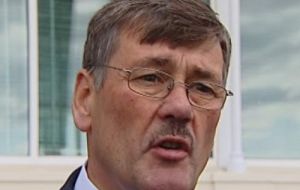MercoPress. South Atlantic News Agency
Closer ties with France and other allies in UK’s forces future
 UK Defence Secretary Bob Ainsworth launches the Green Paper
UK Defence Secretary Bob Ainsworth launches the Green Paper The British Armed Services will have to rely more on France and other international allies as they face “tough choices” in the coming years, said UK Defence Secretary Bob Ainsworth on the launching of Government Green Paper that will pave the way for a full-scale strategic defence review after the General Election.
The increasing cost of the British military has called into question the possibility of two of the Armed Services combining. As the contents of the green paper were announced the Chief of the Defence Staff, Air Chief Marshal Sir Jock Stirrup, was asked if it was “plausible” that three separate armed services would still exist in a decade from now.
“Certainly it is plausible,” he told the MoD news conference, but said there were issues to be debated. He said the close collaboration of Britain's Armed Services in Afghanistan demonstrates how the lines between each section are breaking down.
The new document does not refer directly to the future of specific programs - except to confirm the £20 billion update of Britain's Trident nuclear deterrent will still go ahead.
Mr Ainsworth said the “likelihood” is the Royal Navy will still get two new aircraft carriers but he would not comment on the American-built Joint Strike Fighters intended to fly from them. Funding for Afghanistan is to increase from £3.5 billion this year to £5b billion in 2011.
But Mr Ainsworth said in future the forces will not be able to “insure against every risk” and decisions will have to be taken on where the most important priorities lie.
“Tough choices will lie ahead and we need to rebalance our budget to better reflect our priorities,” he said at the Ministry of Defence news conference.
While the Green Paper emphasises that the United States remains Britain's most important ally, it says the UK will in future have to look to co-operate more widely with other countries.
“In Europe, the return of France to Nato's integrated military structures offers an opportunity for even greater co-operation with a key partner across a range of defence activity,” it said.
The paper identified the three main threats as terrorists such as al Qaeda, hostile states and fragile or failing states. It said that in future, the UK and its allies would not necessarily maintain the “technological edge” they had become accustomed to over the past 20 years as other nations closed the technology gap.
The paper also warned of the threat of “cyber attack”, as the forces became more reliant on hi-tech capabilities.




Top Comments
Disclaimer & comment rulesCommenting for this story is now closed.
If you have a Facebook account, become a fan and comment on our Facebook Page!